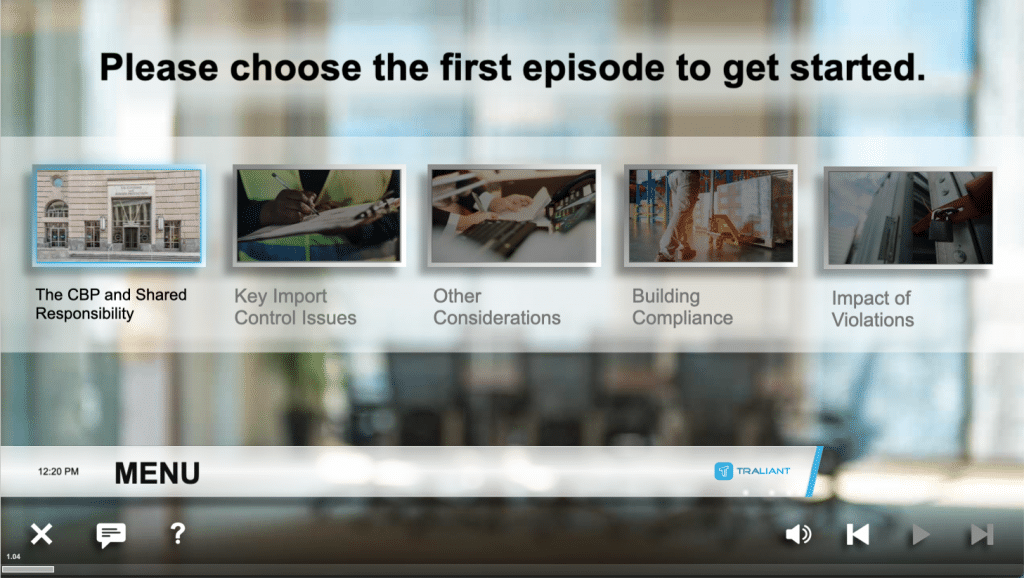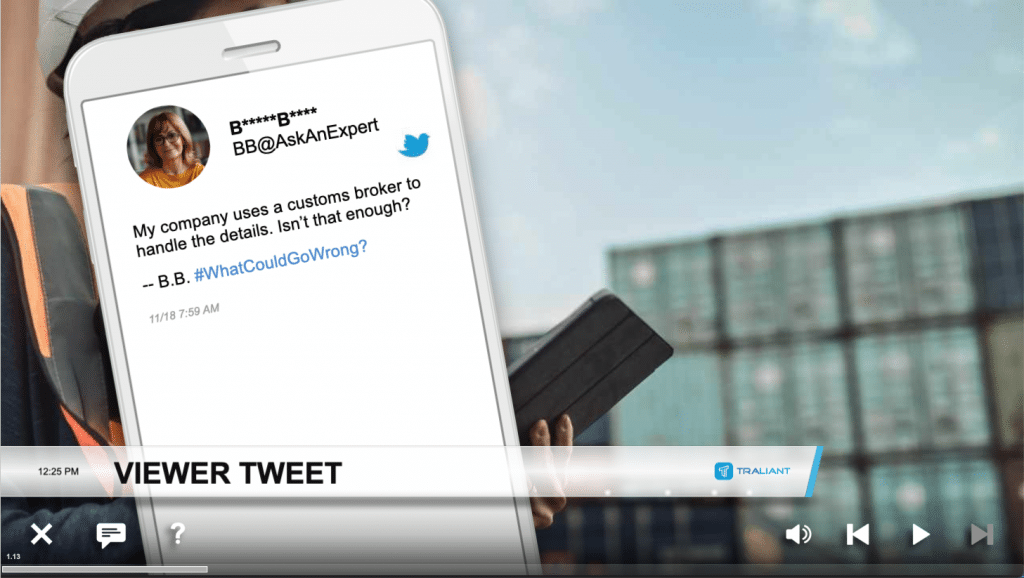
US Import Regulation
Avoid costly penalties and reputational damage by ensuring your employees follow regulations for how goods must enter the United States.
Course description
Traliant’s Import Regulation training is a 20-minute, interactive course that introduces managers and employees to the basic concepts of US import controls. The course covers the concept of shared responsibility for import compliance, the importance of an organizational compliance program, as well as they basics of classification, valuation, country of origin, intellectual property rights issues and OFAC compliance. Traliant also offers a related course on US Export Controls, covering the regulations governing the shipment, transfer and dissemination of goods, services and technology.
ONLINE TRAINING
US Import Regulation

The course covers:
- US Customs and Border Protection (CBP) and shared responsibility
- Key import control issues
- Overview of federal agencies involved in import control
- Product classification
- Customs valuations
- County of origin
- Intellectual property protections
- Types of import sanctions
- Import compliance programs
- Consequences of violating import laws
THE TRALIANT DIFFERENCE
Compliance you can trust.
Training you will love.

Legal expertise
Our in-house legal team monitors the latest laws, rules and regulations, so you don't have to. You can rest assured that our courses are continuously compliant.

Brilliant training
With cinematic-quality videos produced by our Hollywood-based team, your employees will love our customizable, interactive, story-based training.

Valued partnership
Our main focus? It’s all about making your job easier. We do that with unmatched responsiveness and seamless deployment, dedicated to driving your success.

Meaningful impact
We don’t just deliver brilliant training, we help you create meaningful impact by broadening your employees' perspectives, achieving compliance and elevating culture.
KEY FEATURES
Why you'll love our training
It’s time to embrace a new era of online training with a valued partner who will ensure seamless implementation to fit your exact, a truly enjoyable learning experience and courses with continuous compliance you can trust.
Compliance expertise
Traliant's in-hour legal expertise ensures training is accurate and kept up-to-date with any regulatory changes.
Accessible to users with disabilities
Traliant provides an inclusive experience for all users, including those with disabilities, by going beyond Section 508-C standards and offering WCAG 2.1 AA.
Story-based learning
Our story-based approach blends leading instructional design with Hollywood talent to produce engaging, interactive and nuanced training.
Course administration
Traliant makes it simple to roll out training to your workplace and provide technical support directly to your employees at no additional cost.
Course customizations
Tailor courses to include your logo, relevant policies, workplace images, and more. Traliant can even customize the course with scenarios that take place in your own workplace environment.
Translations
Training is available in English, Spanish and is supported in over 100 languages.
COMPLIANCE EXPERTISE
Your partner in training compliance

Uniquely qualified in-house compliance team
Our exceptional in-house Compliance Advisory Team is led by Michael Johnson, Chief Strategy Officer and former U.S. Department of Justice attorney who has provided training and guidance to organizations like the Equal Employment Opportunity Commission, Google, the United Nations, and the World Bank.

Keeping you compliant, effortlessly
Keeping up with the complex web of employment laws — especially if your workforce spans multiple states — can be tricky. That’s why we offer a streamlined training solution that ensures you stay compliant with federal, state, and local regulations, so you can focus on what matters most: your team.

Simplifying your policies and handbooks
Crafting an employee handbook that meets legal standards can be daunting. Let us ease the burden. We help you navigate regulatory changes to ensure your policies and handbooks not only comply with the law but also reflect industry best practices.
What to consider when choosing the most effective US import regulation training

- Ensure compliance: Import regulations can be complex and vary depending on the type of goods being imported. Training helps organizations and their employees understand and comply with import requirements, minimizing the risk of delays, penalties, or legal issues.
- Streamline import processes: A well-trained workforce can navigate the import process more efficiently, avoiding unnecessary delays and costs.
- Protect the organization's reputation: Violating import regulations can damage a company's reputation and make it difficult to do business in the future.
- Empower employees: Training provides employees with the knowledge and skills they need to understand U.S. import regulations and to make informed decisions about import transactions.
- Strengthen your organization's import compliance program: A robust import training program is an essential component of a strong compliance program, helping to mitigate legal and reputational risks.
- Promote a culture of compliance: Training helps to create a culture where employees understand that compliance with import regulations is essential for the success of the business.
- Product classification: Properly classifying goods to determine the appropriate duties and taxes.
- Customs valuation: Accurately valuing goods to determine the amount of duties and taxes owed.
- Country of origin: Correctly identifying the country of origin for imported goods.
- Intellectual property protections: Understanding how to protect intellectual property rights when importing goods.
- Import sanctions: Learning about the types of import sanctions that are in place and how they affect import transactions.
- Fines: Companies can be fined for violations of import regulations.
- Seizure of goods: CBP can seize goods that are not imported in compliance with the law.
- Increased scrutiny: Companies that violate import regulations may be subject to increased scrutiny from CBP in the future.
- Loss of import privileges: In some cases, companies can lose their ability to import goods into the U.S.
- Written policies and procedures: Clear guidelines for complying with import regulations.
- Designated compliance personnel: Individuals responsible for overseeing import compliance.
- Training: Regular import training for all employees involved in the import process.
- Recordkeeping: Maintaining accurate and complete records of import transactions.
- Auditing: Regular audits to assess the effectiveness of the compliance program and to identify any areas for improvement.









